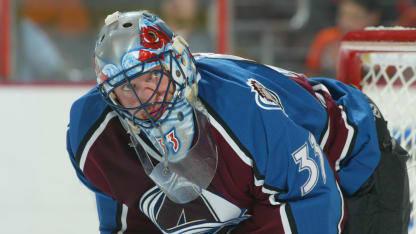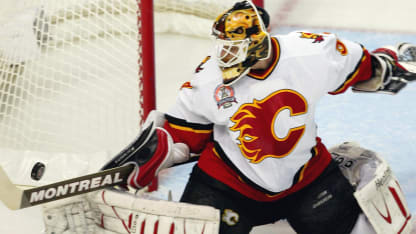It also allowed him some important rest; he played 39 games that season, and Roman Turek and Jamie McLennan carried the mail for us and allowed us to remain competitive.
Once healthy and energized, Kiprusoff brought that team all the way to a Game 7 in the Stanley Cup Final against the Tampa Bay Lightning.
After the lockout year, Keenan started Kiprusoff 74 times in 2007-08, and the Flames lost in the first round of the playoffs to the San Jose Sharks. But for Keenan, there was no question that he was living or dying with his top goaltender.
Let me share this story with you: Arriving in the early morning in Denver to play the Avalanche on the back end of back-to-back games, I suggested to Keenan that putting in our backup, Curtis McElhinney, might be a wise decision because it would allow Kiprusoff to rest and get back to his winning ways. Upon arrival at the downtown hotel, Keenan met Kiprusoff as he stepped off the team bus and bluntly asked him if he knew Glenn Hall. Half asleep, Kiprusoff said no. Keenan replied, "Glenn Hall played five years without a break so you are playing our next game here against the Avalanche!"
That was the end of any discussion about putting McElhinney in goal for the rest of the season.
I also recall the previous year, 2006-07 when the Anaheim Ducks won the Cup, they gave Jean-Sebastien Giguere 53 starts. He split time with Ilya Bryzgalov. They needed both goalies during the playoffs, and Bryzgalov's four starts allowed Giguere to get back on track and adjust his details with his goaltending coach, Francois Allaire.
\[RELATED: Super 16: Predators unanimous No. 1\]
This season, some teams have heavily ridden their No. 1 goalie. The Winnipeg Jets have played Connor Hellebuyck in 63 games already, the same number Frederik Andersen has played in Toronto. The Columbus Blue Jackets have played Sergei Bobrovsky 62 times, but are in a fight for their playoff lives. Will they run out of gas?
Conversely, will the well-managed minutes of Tuukka Rask with the Boston Bruins (49 games), Brayden Holtby (51) with the Washington Capitals andPekka Rinne (56) with the Nashville Predators allow their respective teams to ultimately compete for the Cup?
I think there's ample evidence now that teams need to consider that a more realistic number of starts is a maximum range of 60-65 games in the regular season to ensure that the No. 1 goalie is healthy, physically and mentally, and energized for the duration of an excruciating two months of playoff hockey.





